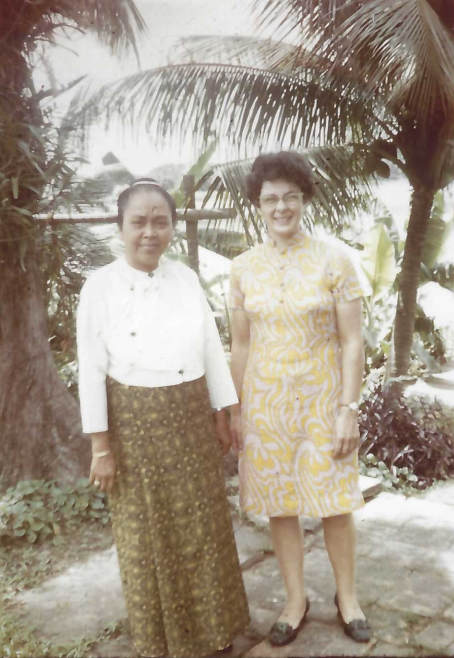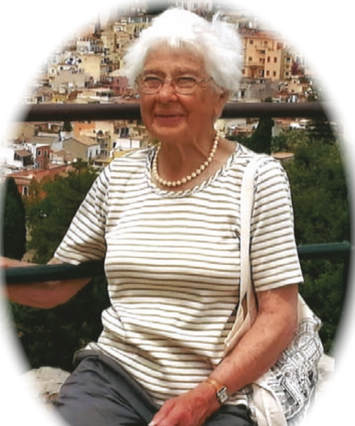To fellow dog walkers of Clacton-on-Sea, Jill came across as a warm friend with impeccable manners and a quiet authority – qualities which derived in part (though few knew it) from her schooling at Cheltenham Ladies College.
To the succession of young children she looked after in various parts of Britain she was a loved aunt, and in their adulthood a trusted confidante and prolific letter writer. Open about her own frailties, she could help steer friends through many a crisis with a blend of encouragement and gentle reproof.
Jill also scored highly in her care for the aged, starting with her parents, for whom in their need she returned to Clacton. After their death she stayed on, opening her home to families who could not otherwise afford a seaside holiday.
Her early morning pot of tea was part of a daily hour of Bible study, going through a large prayer list, and listening for inspiration, with pen and paper at the ready. She believed that God has a plan for the world and each of us can find our part. Like her parents she took heart from the idea of Moral Re-Armament (MRA), with its advocacy of absolute moral standards as the basis for decision-making at all levels.
As a teenager in the aftermath of World War Two, she understood the pressing need for reconciliation among former enemies, and for a spiritual militancy in democracies facing the onset of materialist ideologies. The prayer for God’s will to be done on earth called for practical commitment, not just a casual hope. After a brief spell as a teacher, Jill became a full-time volunteer with MRA, often serving on the logistical side of its UK programmes, and at its international conference centre in Caux, Switzerland. The main building, in its previous life an elegant hotel, could accommodate about 450 people and Jill became one of the team of skilled housekeepers.
In the mid-1960s a parallel Asian conference centre was taking shape at Panchgani, in western India, under the leadership of Rajmohan Gandhi, a grandson of the Mahatma. He issued an invitation to European teachers who would help with its educational outreach. In 1968 Jill was one of several British who responded. Her two years based in India included visits to Sri Lanka and three other Asian countries. The longest stay was in Malaysia.
In May 1969 there were race riots in Malaysia between Malays and Chinese, resulting in many deaths. The Chinese blamed a Malay politician called Jaafar Albar. A senior Chinese educator Thio Chan Bee in nearby Singapore had the alarming thought of a heart-to-heart talk with Albar. One result was that Albar came with him and two others to a conference at Panchgani. Inspired by the spirit of reconciliation there, Albar invited the musical show Anything To Declare? to come to Malaysia. Produced in Europe with a company of about 60 people, it was touring India before going to Australia.
Back home Albar formed an interracial committee and persuaded Prime Minister Tunku Abdel Rahman to become its patron. He asked Rajmohan Gandhi for two people who would come ahead from Panchgani to help the committee with their preparations. Gandhi asked Jill and another British teacher, Jean Robertson (later Everington). Feelings were still raw, not least in the university in Kuala Lumpur, but the student leadership became convinced, and Government ministers attended the opening night in the university theatre. The PM and community leaders paid tribute to MRA’s contribution. Jill and Jean were in the country for four months and formed lifelong friendships with some of their hosts.
During Jill’s two years in Asia, a senior Burmese educator known as Ma Mi, one of the pioneers of MRA in her region, fell ill with terminal cancer at Panchgani. Jill was one of those who gave constant care in the weeks leading to her death. A last wish was for her set of precious ruby buttons to be taken to her sister in Rangoon. This was no easy task since the military government exercised strict controls on entry. Jill volunteered, asking Jean to accompany her, and the mission was accomplished. Apart from Ma Mi’s family, one of the people they met was Madame Aung Sang.
Jill is remembered by families in New Zealand, Australia, USA and around UK for her courage and her thoughtful generosity. She was devoted to her Norfolk cousins who gave her loving care to the last.
English


